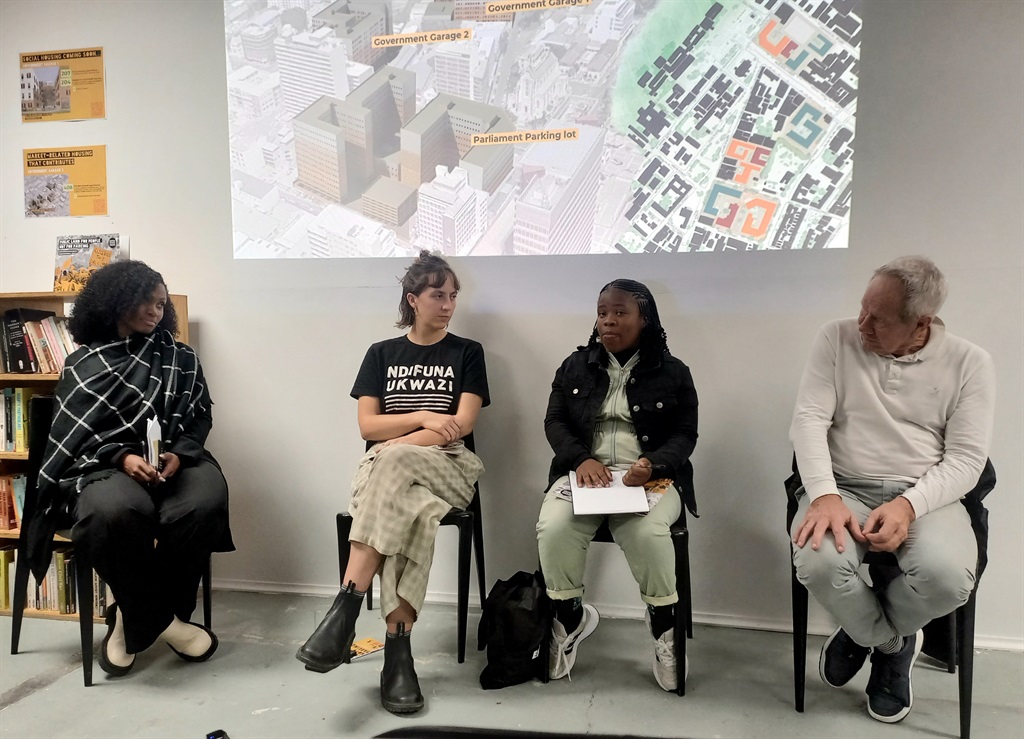Ndifuna Ukwazi’s Mpho Raboeane and Robyn Park-Ross, Anoxolo Felane from Indibano Yabahlali and Malcolm McCarthy, former National Association of Social Housing Organisations (NASHO), joined in a panel discussion on Tuesday night about affordable housing in Cape Town. (Marecia Damons/GroundUp)
- Housing activists in Cape Town handed over 12 additional applications to the Department of Public Works for state-owned land to be released for affordable housing.
- They identified 32 pieces of land in Gauteng, KwaZulu-Natal and the Western Cape.
- They want President Cyril Ramaphosa to use the State Land Disposal Act of 1961 to make public land available for housing.
“If you live in Khayelitsha and you commute to town for your whole working career, you lose five years of your life just sitting in traffic,” Ndifuna Ukwazi (NU) housing activist Robyn Park-Ross said, according to GroundUp.
Park-Ross was among activists who went to the Department of Public Works offices in Cape Town on Wednesday to hand over 12 new applications for pieces of public land to be used for housing. They want President Cyril Ramaphosa to use the State Land Disposal Act of 1961 to make public land available for housing. The Act grants the president the power to donate, sell, lease or exchange any piece of public land in the country.
Their applications were accepted by Mzimkhulu Gusha from the Department of Public Works.
The activists had already identified 32 parcels of land in Gauteng, KwaZulu-Natal, and the Western Cape.
In a report released on Tuesday evening, Ndifuna Ukwazi said four sites – Parliament’s parking lot in Roeland Street, owned by the national government; Top Yard parking lot in Glynn Street and the government garages in Hope Street and Roeland Street (all owned by the Western Cape government) – should be used for housing.
The report builds on the #Land4PeopleNot4Parking campaign by housing activists from NU, Reclaim the City, Housing Assembly, and Indibano Yabahlali.
They say these four state-owned parking lots could create a “racially and economically diverse neighbourhood” by providing about 970 social housing apartments, about 970 market-related apartments, and homes for more than 700 people.
The report said:
Households should not spend more than one-third of their income on rent or a mortgage. Just because a product is cheaper than the market, does not mean that it is truly affordable, especially when the market is overvalued.
The activists want the government to review the use of public land in cities.
According to the City of Cape Town’s Integrated Human Settlements Plan, there are about 360 000 people on the housing waiting list. “The current rate of state-assisted housing delivery remains far below what is needed to address rapidly growing demand, let alone the existing housing backlog,” NU said.
The City’s human settlements department projected a shortfall in the development od housing opportunities of between 22 970 and 27 980 every year between 2018 and 2028 — assuming the average annual rate of supply of dwellings and serviced sites, by both in the private and public sectors, is unchanged.
WATCH | Activists ask Western Cape premier to consider turning CBD parking lots into social housing
“As a result,” the NU’s report said, “many families have no way to access a home except in informal settlements.”
Anoxolo Felane from Indibano Yabahlali said: “Having cars driving in and out every day affects the climate because it’s emitting carbon dioxide and destroying the ozone layer.
“We want to move to the CBD because it’s closer to work and school instead of needing to take transport.”
Former National Association of Social Housing Organisations (Nasho) general manager Malcolm McCarthy said without intervention from the government, there would never be better housing opportunities for people in lower income brackets
“With no intervention, we’re never going to have better economic integration. In South Africa, because of apartheid, most of the people who are poor are black. If we can improve economic integration, there will be a better opportunity for racial integration in Cape Town,” said McCarthy.
